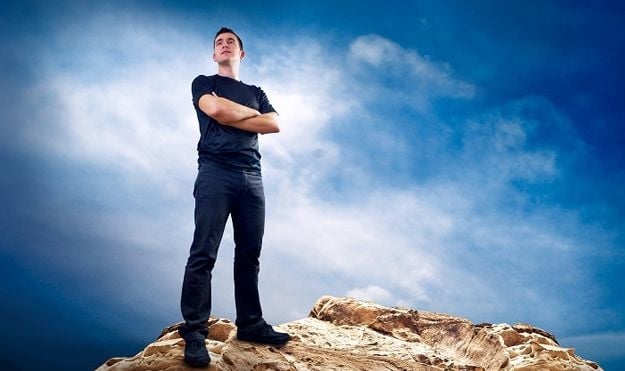Tips for Building Self-Confidence
If we contemplate the reality of our lives that we live day by day, we would find that we missed a lot of our life opportunities and that we behaved in many ways that were out of character.
The situation may lead us to the point of giving up our goals, and we may sometimes give up our goals because of our low self-confidence.
Low self-confidence is considered one of the most damaging to an individual's life. It has dire consequences and may compel them to end their lives altogether. Suicide is frequently brought on by a person's low self-esteem. The following issues may be the most common ones experienced by those lacking in self-confidence:
- Anxiety, stress, and accompanying depression.
- Intellectual dispersion and loss of purpose.
- Inability to make decisions.
- A person develops into someone who puts the needs of others above their own.
There are many problems that individuals who lack self-confidence suffer from, which are not mentioned in the lines of this article, but we will review together some concepts that help build self-confidence by knowing the definition of self-confidence, what are the most important things that harm one’s self-confidence, and the importance of self-confidence; Is self-confidence an innate talent or is it acquired?
What is self-confidence?
There are many definitions that explain the concept of self-confidence, but all researchers and specialists agree that it means a person’s belief in themselves and their abilities to face life’s challenges and deal with them.
What are the things that destroy a person's self-confidence?
1. Upbringing and surroundings
Upbringing plays an effective role in a person’s lack of self-confidence through grave mistakes committed by parents against children, such as excessive protection, excessive coddling, and not holding them responsible. The environment, such as school and friends, also plays an effective role in undermining confidence. Behaviors such as bullying in school, physical and moral violence, and children bullying each other all negatively affect building self-confidence.
2. Guilt complex
In our Arab society in particular, we suffer from a guilt complex that does not leave us throughout our daily lives, to the extent that even in moments of happiness and joy, one of us might say, "Oh God, grant us the best of this happiness." If we reflect on this statement, we will find that the correct interpretation is that the state of happiness is considered exceptional, while the guilt complex we constantly experience is the prevailing state that should be the norm. Here, I pose a question, and I am sure you will answer it with utmost honesty: Is there any society in this world that experiences the guilt complex as people in the Middle East, in general, and the Arab community, in particular? I leave it to you to answer that.
3. Neglecting personal feelings
Candidly and without mincing words, most of us, without exception, prioritize the feelings and concerns of others, regardless of our own feelings. Who among us does not take into account the feelings of their manager at work at the expense of their own feelings? And who among us does not take into account the feelings of their teacher at the expense of their own?
Even to the extent that the husband may consider his wife's feelings or the opposite at the expense of their own feelings. Therefore, a lack of concern for one's own feelings and desires turns a person into a servant of others' feelings, when one should prioritize their own feelings to maintain and manage them properly.
4. Comparing oneself to others
There is a very beautiful phrase that most of us know but may not fully understand its impact: "The only person you should compare yourself to is only you."
If we contemplate this phrase, we would find that every time a person compares themselves to others, they undermine their self-worth and self-confidence. Little by little, a person begins to see everyone as better than them and ends up low on self-confidence.

Why is self-confidence important for humans?
The importance of self-confidence stems from its close relationship with human life in all its social, emotional, cultural, and economic aspects. No one in this world can achieve success in their life without being free and independent. A person's freedom is closely linked to their self-confidence.
Is confidence a talent, or is it an acquired skill?
Perhaps the question on your mind now is: Is confidence a talent, or is it an acquired skill?
The answer to this question bears both aspects, but in different proportions. What is meant here is that there are individuals who are born with a certain inherent rebelliousness. How many times have we heard people say, “My child has an independent personality,” or “He is a leader among his siblings,” or someone saying they have a love for leadership? All of these qualities can be naturally inherent in a person, and all of them can be reflected in future self-confidence, but all of the above are individual cases and may be few compared to others. Therefore, self-confidence is the closest thing to skills a person can acquire through training.
Here we come to the most important point in obtaining a working method that one can use in their life to boost their self-confidence and reflect this confidence in their daily life. This is possible by following the following steps:
Step one: choose people carefully
To build a person's self-confidence, one must first rearrange the people in their life—in other words, filter the list of people in their life. If they want to develop the skill of self-confidence, they must work to stay away from negative people who make them feel insecure. Instead, they should surround themselves with individuals who value the essence of life and their own worth. Everything in life can be acquired through contagion.
There is a popular proverb that says, “Associate with the happy, and you will be happy; associate with the miserable, and you will be miserable.” This proverb applies perfectly to how one gains self-confidence. It is not possible for one to increase self-confidence while associating with those who are afraid and pessimistic in their lives.
Step two: train yourself to face challenges
We are fully aware of the extent of the difficulties that one can deal with in daily life. Despite its great development, this life is full of many difficulties and obstacles that affect the human psyche and may make them lose confidence in themselves and their abilities; however, giving up is not an option. Quite the contrary. The only solution is to confront and accept these difficulties and turn to them without fear. It involves working on overcoming these challenges with self-belief, self-appreciation, embracing change, possessing mental flexibility, and always looking at the glass as half full.
Some might argue that this is just theoretical and detached from reality. However, there is no solution other than confronting these challenges or submitting to them and accepting the harsh reality. Which option would you prefer?
Step three: practice visualization
Visualization is one of the most important methods that help a person build self-confidence, as it allows them to create the world they desire, free from external influences. Personal visualization stems from an individual's free desires, far from external influences. Gradually, these visualizations can be turned into reality.
For example, if you want to be a writer, just visualize yourself writing and getting writing awards.
In another example, if a person likes to have a good body, all they have to do is visualize themselves exercising, building muscles, and wearing the clothes they desire. Turning this visualization into reality begins by following a specific diet according to the personal situation, practicing sports, and observing the results. Visualization is very important in gaining self-confidence, but it is also very important not to exaggerate in visualization, to be realistic in fantasies, and not to ask for the impossible.
Step four: appreciate your accomplishments
Self-esteem is very important in gaining self-confidence; it comes from not underestimating personal achievements and not listening to the words of the frustrated. Take a group of people who would like to quit smoking as an example. They start a plan to reduce the number of daily cigarettes, and they may succeed in it at first, but the words of those around them may affect them, so they lose confidence in themselves and do not appreciate their achievements, eventually returning to the habit of smoking. Many of us have heard people say, “Does reducing one cigarette per day mean that you will quit smoking?” And they heard others say, “It won't work; I've said it dozens of times before.”
A person may be affected by these words, but if they appreciate themselves and their achievements, they will realize for sure how great an achievement they made when reducing the number of daily cigarettes by one or when they woke up a quarter of an hour earlier than their usual wake-up time.

Step five: find the things you love in life
Have you ever imagined going back to your childhood? You may find this question a little strange, but if we reflect a little and go back to our childhood, we would find that we were more confident in ourselves than now. Didn't you reject the things that you didn't like? Didn't your parents put pressure on you to wear a certain dress, and you refused just because you didn't like it?
There are many examples that we experienced in reality in our childhood that indicate our adherence to the things that we love. So why now, after accumulating all this awareness and regardless of the reason, do we give up what we love?
Searching for the things we love and working to acquire them increases our self-confidence, abilities, and choices, which reflects positively on us.
Step six: say "no" without fearing the consequences
You must be certain that you are the top priority in the world, so put yourself first and stop trying to be perfect. You should also avoid acting on anything you are not completely convinced of, as well as giving up your right to research and gather proof for any issues that may come up in your life. Saying "no" to things that conflict with your desires and aspirations is not something to be afraid of, because saying "no" more often will save you from more pressure than saying "yes" a thousand times. By not letting other people determine your fate when you have a good reason to say "no," you are in some way boosting your confidence.
In conclusion
Before you make your final decision on which side you will stand, you should know that self-confidence is the key to your success in this life. It is the first step towards achieving your goals and dreams. So you have to know that a person's past does not equal their present, and no matter how hard life experiences are for you, you always have a chance to rise.
Do not give up, and do not say this is my lot and this is my luck. In this context, Kimberly Friedmutter, author of The Power of the Unconscious, says, “One's use of phrases such as ‘I failed,’ ‘This is my luck,’ or ‘I knew that this would happen to me,’ shatters the individual's self-confidence.”